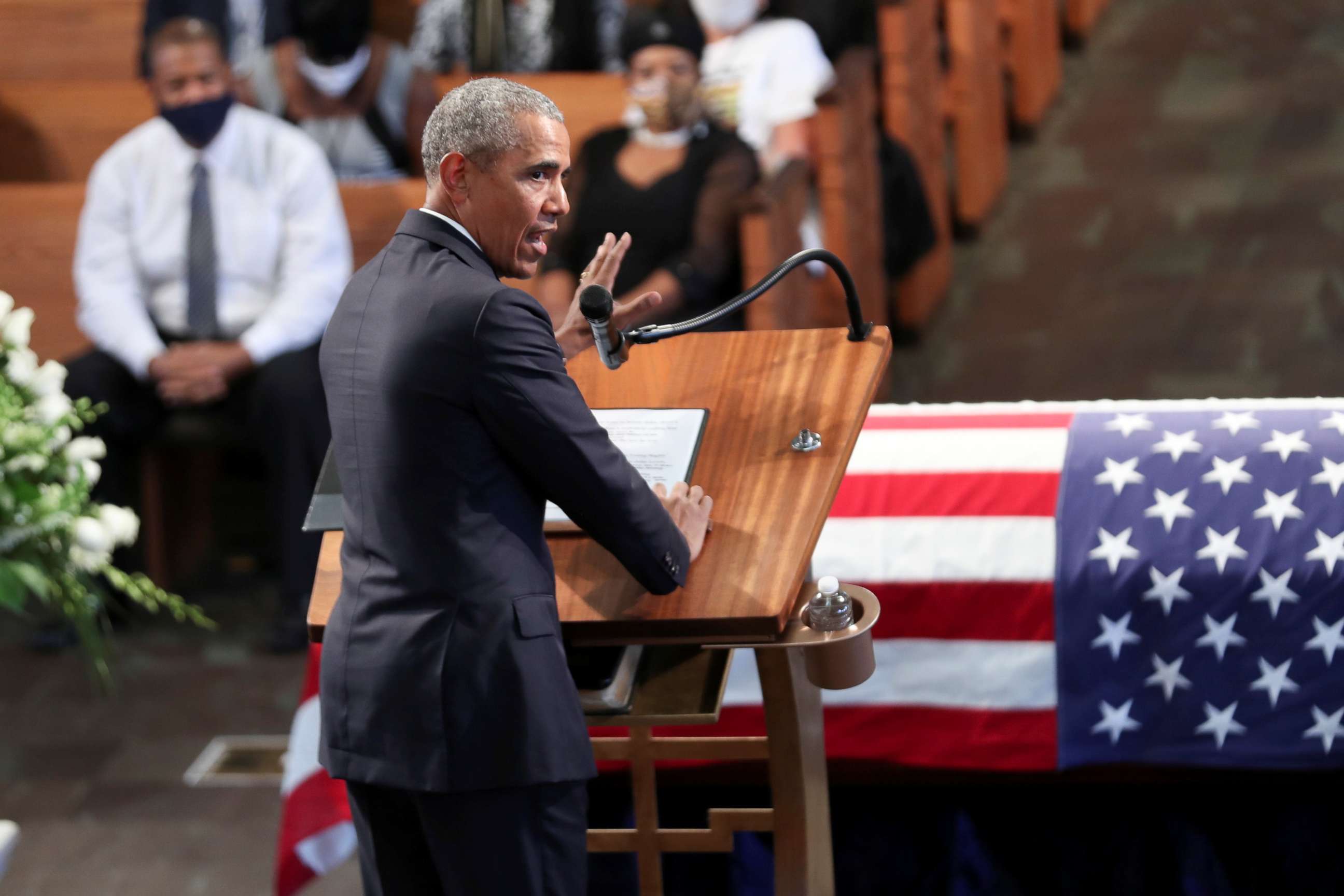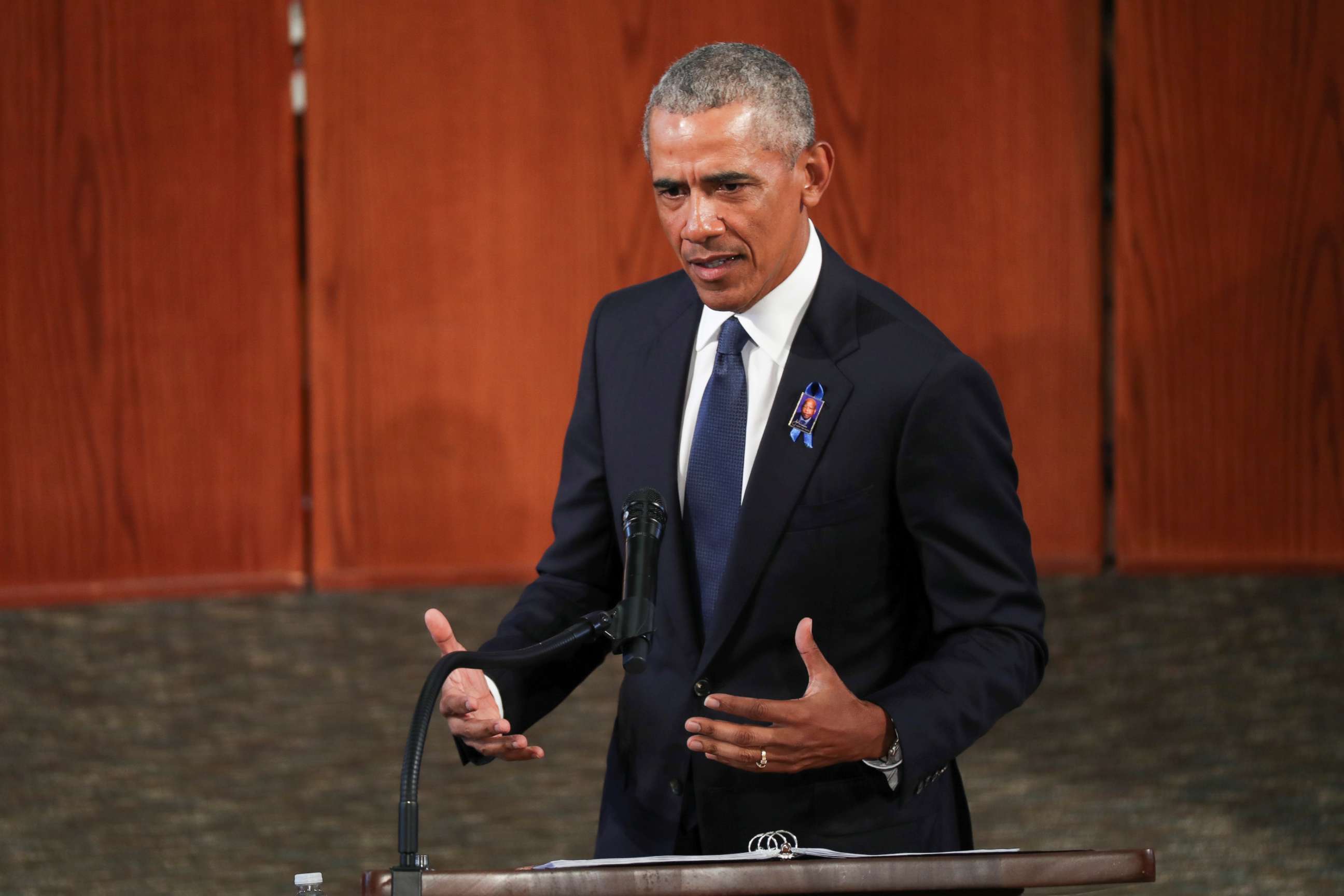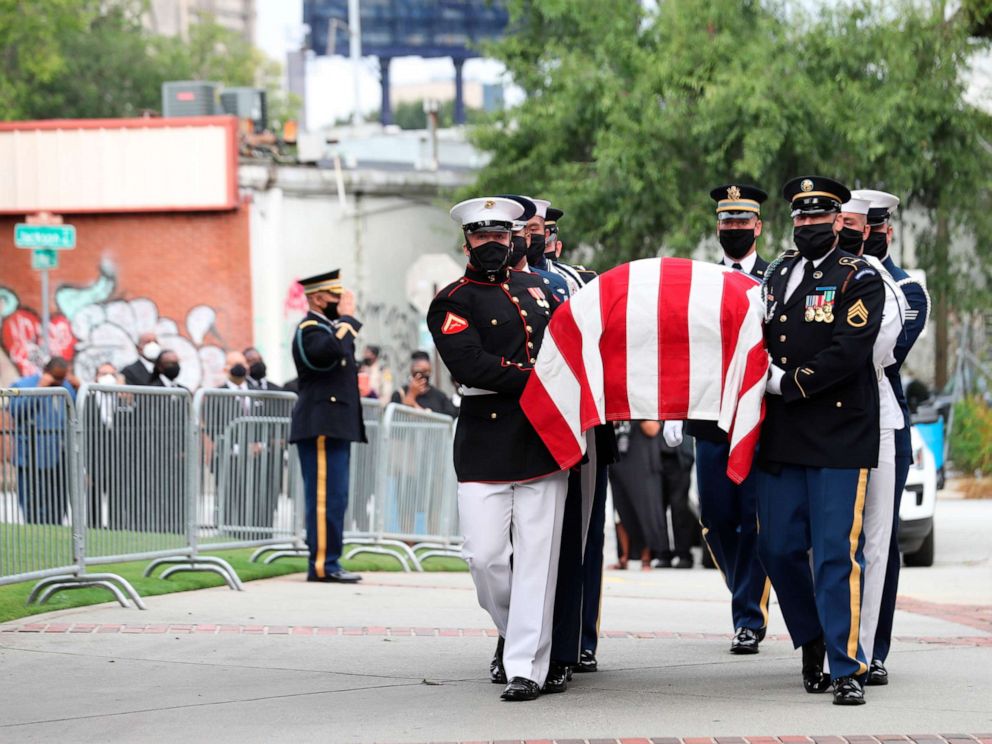The Note: Presidents offer dueling views on country's voting systems
Trump doubled down in his criticism of mail-in voting late Thursday.
The TAKE with MaryAlice Parks
Two U.S. presidents Thursday warned about persistent threats against the country's voting systems -- albeit they argued from very different sides, in stark disagreement about what is actually jeopardizing the integrity of elections.
"We may no longer have to guess the number of jelly beans in a jar in order to cast a ballot, but even as we sit here, there are those in power who are doing their darnedest to discourage people from voting by closing polling locations and targeting minorities and students with restrictive ID laws and attacking our voting rights with surgical precision," former President Barack Obama said during his eulogy for the late congressman and civil rights leader John Lewis during his funeral in Atlanta.
Though he did not mention President Donald Trump by name, Obama went on to blast leaders such as Trump, who have even questioned the postal service this year "in the run-up to an election that's going to be dependent on mail-in ballots so people don't get sick."
The comments from 44 felt like a direct response to a shocking tweet just hours before from 45, though they were likely written well in advance.

Republican leaders were quick to shoot down Trump's suggestion Thursday that Election Day should possibly be moved. Any change of date would take an act from Congress.
He hedged on that tweet at a later briefing, but Trump doubled down in his criticism of mail-in voting late Thursday, when he argued that results should be known on election night. Of course, that would be nearly impossible if mail-in and absentee voting continues at the high rates seen this spring and summer.
With his controversial statements, Trump is strong-arming Democrats to go on the record over and over again to reassure voters that this election will be fair, ahead of any unforeseen or unanticipated forms of voter suppression between now and Election Day. Trump may be backing Democrats into a tricky corner, by forcing them to defend mail-in voting systems, which could greatly expand access, but could also be messy if implemented too hastily.
The RUNDOWN with Kendall Karson
For Democrats, when President Obama does it, it's considered en vogue.
In the middle of a passionate eulogy of the late Congressman John Lewis, Obama implored both those before him inside Ebenezer Baptist Church in Atlanta, and the country at large, to push beyond reforms of the past, and honor the civil rights icon by fundamentally changing key tenets around voting rights, such as passing legislation to automatically register all Americans to vote, providing statehood to Washington, D.C., and Puerto Rico, making Election Day a national holiday and ending partisan gerrymandering.
"And if all this takes eliminating the filibuster, another Jim Crow relic, in order to secure the God-given rights of every American, then that's what we should do," he urged from the lectern.
His appeal, and call to scrap the filibuster, puts him ahead of his former vice president, the current Democratic nominee -- a dynamic not too dissimilar from when Joe Biden stepped out ahead of Obama on the issue of same-sex marriage by sharing his support before the then-president.

Biden, a staple of the Senate himself after a 36-year career, has long been a protector of its rules and traditions as well as a champion of bipartisanship. He previously said he does not support getting rid of the procedural tactic, although he more recently expressed an openness to debating ending the filibuster, without ever landing at a firm endorsement.
"I think it's gonna depend on how obstreperous they become," he said earlier this month during a discussion with newspaper columnists, acknowledging, "I have not supported the elimination of the filibuster because it's been used as often ... the other way around [for Republicans' benefit], but I think you have to just take a look at it."
Biden has yet to publicly respond to Obama's suggestion, but his former chief rival, Sen. Bernie Sanders, I-Vt., who also had been opposed to abolishing the tool, changed his tune on Thursday.
"President Obama is absolutely right. It is an outrage that modern-day poll taxes, gerrymandering, ID requirements and other forms of voter suppression still exist today. We must pass a comprehensive agenda to guarantee the rights and dignity of everyone in this country. And that means, among other things, reauthorizing and expanding the Voting Rights Act, for which Congressman John Lewis put his life on the line," Sanders said. "As President Obama said, if that requires us to eliminate the filibuster, then that is what we must do."
The pressure is now on Biden, Democrats' soon-to-be anointed leader, to set the party's direction, even as he has been resistant to embrace some of the largest systematic reforms some Democrats feel are long overdue.
The TIP with John Parkinson
Lawmakers from the state of Georgia sent a bipartisan letter to Gov. Brian Kemp and other Peach State officials to request that the state replace a statue of Alexander Hamilton Stephens, who served as vice president of the Confederate States, with a statue of Democratic Rep. John Lewis.
"Because of the life and activism of John Lewis, America is more fair, more just, and more kind," Rep. Sanford Bishop, D-Ga., wrote in a statement. "There is no better Georgian we could choose to represent our state in our nation's Capitol than our beloved friend, colleague, and hero, John Robert Lewis."

"I can think of no better statue in the U.S. Capitol representing our state than one of John Lewis," Rep. Tom Graves, R-Ga., noted. "Our nation lost a giant, and it's up to us to work together so that John's fight for justice and equality continues."
Kemp tweeted Wednesday that "by putting his statue in the U.S. Capitol, we can celebrate his legacy of service for years to come." Five Republicans from the 16-member congressional delegation from Georgia did not sign onto the letter: Sen. Kelly Loeffler, as well as Reps. Doug Collins, Jody Hice, Barry Loudermilk and Buddy Carter.
ONE MORE THING
Nearly two-thirds of Americans disapprove of President Trump's handling of three major challenges facing the country -- the coronavirus pandemic, nationwide unrest over racial inequality and relations with Russia -- a sign of the challenges that his own reelection bid faces just three months before Election Day. With the White House confronting the most significant reckoning on race since the civil rights movement of the 1960s, the worst public health crisis in a century and the most contentious flare-up with Russia since the Cold War, Americans have little confidence in the job that Trump is doing in all three of these areas.
THE PLAYLIST
ABC News' "Start Here" podcast. Friday morning's episode features "Nightline" co-anchor Byron Pitts on the celebration of Rep. John Lewis' life in Atlanta, which also came with an impassioned message. Then, New York City bar owner Natasha David talks about how the pandemic has affected her business. And, ESPN's Mark Fainaru-Wada breaks down an investigation into the NBA's business with China. http://apple.co/2HPocUL
WHAT YOU NEED TO KNOW THIS WEEKEND
Download the ABC News app and select "The Note" as an item of interest to receive the day's sharpest political analysis.
The Note is a daily ABC News feature that highlights the key political moments of the day ahead. Please check back Monday for the latest.




